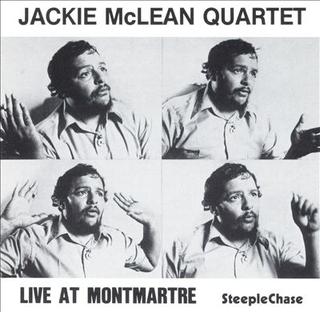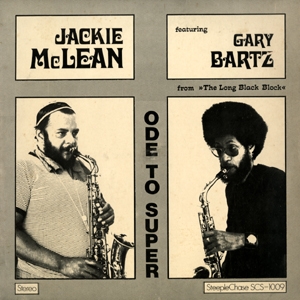Related Research Articles

Bebop or bop is a style of jazz developed in the early to mid-1940s in the United States, which features songs characterized by a fast tempo, complex chord progressions with rapid chord changes and numerous changes of key, instrumental virtuosity, and improvisation based on a combination of harmonic structure, the use of scales and occasional references to the melody.

Charles Parker Jr., also referred to by his nicknames Yardbird or simply Bird, was an American jazz saxophonist and composer. Parker was a highly influential soloist and leading figure in the development of bebop, a form of jazz characterized by fast tempos, virtuosic technique, and advanced harmonies. Parker was a blazingly fast virtuoso and introduced revolutionary harmonic ideas into jazz, including rapid passing chords, new variants of altered chords, and chord substitutions. Primarily a player of the alto saxophone, Bird's tone ranged from clean and penetrating to sweet and somber.
Swing music is a form of jazz that developed in the United States in the 1930s and 1940s. The name came from the emphasis on the off–beat, or weaker pulse. Swing bands usually featured soloists who would improvise on the melody over the arrangement. The danceable swing style of big bands and bandleaders such as Benny Goodman was the dominant form of American popular music from 1935 to 1946, known as the swing era. The verb "to swing" is also used as a term of praise for playing that has a strong groove or drive. Notable musicians of the swing era include Louis Armstrong, Count Basie, Cab Calloway, Jimmy Dorsey, Tommy Dorsey, Duke Ellington, Benny Goodman, Woody Herman, Harry James, Louis Jordan, Glenn Miller, Louis Prima, and Artie Shaw.

Eugene Earl Bostic was an American jazz alto saxophonist and a pioneer of the post-war American rhythm and blues style. He had a number of popular hits such as "Flamingo", "Harlem Nocturne", "Temptation", "Sleep", "Special Delivery Stomp" and "Where or When", which all showed off his characteristic growl on the horn. He was a major influence on John Coltrane.

Philip Wells Woods was an American jazz alto saxophonist, clarinetist, bandleader, and composer.
"Donna Lee" is a bebop jazz standard attributed to Charlie Parker, although Miles Davis has also claimed authorship. Written in A-flat, it is based on the chord changes of the jazz standard "(Back Home Again in) Indiana". Beginning with an unusual half-bar rest, "Donna Lee" is a very complex, fast-moving chart with a compositional style based on four-note groups over each change.

Rhythm changes are a common 32-bar chord progression in jazz, originating as the chord progression for George Gershwin's "I Got Rhythm". The progression is in AABA form, with each A section based on repetitions of the ubiquitous I–vi–ii–V sequence (or variants such as iii–vi–ii–V), and the B section using a circle of fifths sequence based on III7–VI7–II7–V7, a progression which is sometimes given passing chords.

Jazz at Massey Hall is a live jazz album featuring a performance by "The Quintet" given on 15 May 1953 at Massey Hall in Toronto. The quintet was composed of five leading 'modern' players of the day: Dizzy Gillespie, Charlie Parker, Bud Powell, Charles Mingus, and Max Roach. It was the only time that the five men recorded together as a unit, and it was the last recorded meeting of Parker and Gillespie.

Art Pepper + Eleven – Modern Jazz Classics is a 1960 jazz big band album by saxophonist Art Pepper performing under the direction and arrangements of Marty Paich. The recording is one of several dates Pepper made with Paich and his big band in 1959 and is the only one with Pepper as leader. The recording focuses on Paich's big band arrangements of modern jazz classics, including Denzil Best's "Move," Thelonious Monk's "'Round Midnight," Gerry Mulligan's "Walkin' Shoes". Highlights of the recording are Pepper's clarinet performances on "Anthropology" and the alternate takes of "Walkin'."

Jazz improvisation is the spontaneous invention of melodic solo lines or accompaniment parts. It is one of the defining elements of jazz. Improvisation is composing on the spot, when a singer or instrumentalist invents melodies and lines over a chord progression played by rhythm section instruments and accompanied by drums. Although blues, rock, and other genres use improvisation, it is done over relatively simple chord progressions which often remain in one key.
This is a list of recordings by American jazz alto saxophonist Charlie Parker. Parker primarily recorded for three labels: Savoy, Dial, and Verve. His work with these labels has been chronicled in box sets. Charlie Parker's Savoy and Dial Sessions have been issued on The Complete Savoy Sessions, Charlie Parker on Dial and Complete Charlie Parker on Dial and The Complete Savoy & Dial Master Takes. His Verve recordings are available on Bird: The Complete Charlie Parker on Verve and The Complete Verve Master Takes.
"Salt Peanuts" is a bebop tune reportedly composed by Dizzy Gillespie in 1942, credited "with the collaboration of" drummer Kenny Clarke. It is also cited as Charlie Parker's. The lyrics have no meaning. However, they are a skat/bebop vocal which matches the octave note interval played predominantly throughout the song.
"Yardbird Suite" is a bebop standard composed by jazz saxophonist Charlie Parker in 1946. The title combines Parker's nickname "Yardbird" and a colloquial use of the classical music term "suite". The composition uses an 32-bar AABA form. The "graceful, hip melody, became something of an anthem for beboppers."

Complete Charlie Parker on Dial is a 1996 box set release of jazz saxophonist and composer Charlie Parker's 1946-1947 recordings for Dial Records. The box set, released by Jazz Classics, features 89 songs, including alternate takes and notes composed by jazz historian and Parker biographer Ira Gitler. John Genarri, author of the book Blowin' Hot and Cool: Jazz and Its Critics singles out the recording of "Lover Man" on this album, noting that "[t]his wrenching, anguished version...has been called Parker's most poetic statement on record" though, says Gennari, Parker himself viewed it as substandard and threatened physical violence against Ross Russell, a Dial records producer, for including it. Gennari also indicates that other tracks included on this CD—"Relaxin' at Camarillo", "Cheers", "Stupendous" and "Carvin' the Bird"—"have struck many listeners as his most joyous and optimistic."

Charlie Parker on Dial: The Complete Sessions is a 1993 four-disc box set collecting jazz saxophonist and composer Charlie Parker's 1940s recordings for Dial Records. The box set, released by the English label Spotlite Records, assembled into a single package the multi-volume compilation albums the label had released by Spotlite on vinyl in the 1970s under the series title Charlie Parker on Dial. The box set has been critically well received. In 1996, a different box set collecting Parker's work with Dial was assembled by Jazz Classics and released as Complete Charlie Parker on Dial.

Far Cry is a jazz album by musician Eric Dolphy with trumpeter Booker Little, originally released in 1962 on New Jazz, a subsidiary of the Prestige label. Featuring their co-led quintet, it is one of the few studio recordings of their partnership. It is also one of the earliest appearances of bassist Ron Carter on record. Dolphy took part in Ornette Coleman's Free Jazz session before recording this album on the same day.

Live at Montmartre is an album by American saxophonist Jackie McLean recorded at the Jazzhus Montmartre in 1972 and released on the SteepleChase label.

Ode to Super is an album by American saxophonist Jackie McLean featuring Gary Bartz recorded in 1973 and released on the SteepleChase label.

The Source is a live album by American saxophonist Jackie McLean featuring Dexter Gordon recorded at the Jazzhus Montmartre in 1973 and released on the SteepleChase label.

Warne Marsh Lee Konitz: Jazz Exchange Vol. 3, is a live album by saxophonists Warne Marsh and Lee Konitz which was recorded at the Jazzhus Montmartre in late 1975 and released on the Dutch Storyville label in 1985.
References
- ↑ Miedema, Harry (1975). Alto sax: a history of the jazz alto saxophone via recorded solos, transcribed and annotated. Down Beat. p. 50.
- ↑ "Dexterity". Jazzstandards.com. Retrieved 16 March 2017.
- ↑ The Dial Recordings of Charlie Parker: A Discography. Greenwood Publishing Group. 1998. p. 141. ISBN 978-0-313-29168-5.
| This article about a jazz standard or composition written in the 1940s is a stub. You can help Wikipedia by expanding it. |